Will Packer Mints Money With Black Movies, Will “Never in Million Years” Produce Another Oscars Post-Slap
- Oops!Something went wrong.Please try again later.
- Oops!Something went wrong.Please try again later.
- Oops!Something went wrong.Please try again later.
- Oops!Something went wrong.Please try again later.
- Oops!Something went wrong.Please try again later.
- Oops!Something went wrong.Please try again later.
- Oops!Something went wrong.Please try again later.
- Oops!Something went wrong.Please try again later.
- Oops!Something went wrong.Please try again later.
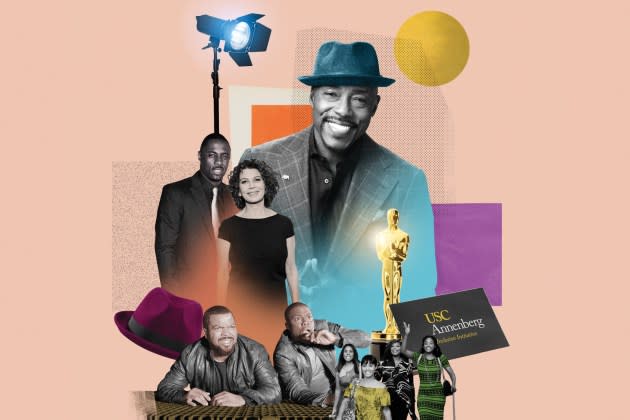
Regina Hall came down with pneumonia while shooting Girls Trip, the irreverent 2017 comedy from Will Packer, a savant who repeatedly has shown an obdurate Hollywood that Black movies can mint money at the box office. Hall recalls Packer’s superpower: persuading anyone, be they filmmakers, studio execs or, in this case, his star, to do what needs to be done. “I came to work, they tested me, and I had a fever. Will said he would rearrange the entire schedule so we could shoot my part first: ‘If you can just get through this scene for me, you won’t have to do anything else,’ ” she says. “I did get through it, and he made sure I had everything I needed to heal.”
Girls Trip — the first movie produced, written, directed by and starring African Americans to cross $100 million at the domestic box office on its way to earning $140.9 million globally — is one of a slew of hits delivered by Packer since he burst onto the scene with Stomp the Yard in 2007. Few producers are a brand unto their own; Packer, 49, is among them, like Jerry Bruckheimer and Tyler Perry. Packer, who recently ranked No. 1 on USC Annenberg’s list of top inclusive producers, is celebrating 10 years of Will Packer Productions (his second movie venture after Rainforest Films), whose features have amassed north of $1 billion worldwide with such titles as Ride Along 2, Straight Outta Compton and What Men Want. It’s also the 10th anniversary of his film deal with Universal.
More from The Hollywood Reporter
Host Jo Koy's Been Charged With a "Celebratory" Golden Globes - That Doesn't Mean He Can't Roast
Kevin Hart Sues YouTuber Tasha K and His Former Assistant Over Alleged Extortion Attempt
Says NBCUniversal Studio Group chair Donna Langley, who wooed Packer while running Universal Pictures: “Will is a great producer who’s not afraid to roll his sleeves up and get his hands dirty. He’s in it across the board, from the cast and director to the marketing and distribution decisions. He’s an all-rounder and all-star.” She continues, “And his focus on diversity, both in front of and behind the camera is a gift to the entire industry.”
Packer is also known for furthering the careers of others. “My career was good, but Girl’s Trip put me in a different conversation,” says Malcolm D. Lee, director of the hit film. “Will deserves a lot of credit for that, meaning it was his brainchild. He called me and said, ‘Why don’t we make a Hangover for Black women?’ He really wanted to lean into that audience, which is very loyal, and let them see themselves being free.”
On the TV side of the aisle, the latest season of the Will Packer Media-produced reality dating show Ready to Love makes its debut Jan. 12 on Oprah Winfrey’s OWN. And in recent days, NBCUniversal’s streaming service Peacock picked up the Packer-produced Fight Night: The Million Dollar Heist. The limited series, starring Kevin Hart, tells the story of an armed robbery orchestrated around Muhammad Ali’s 1970 comeback fight in Atlanta.
The ever-charismatic Packer, who studied electrical engineering at Florida A&M University and lives in Atlanta, spoke with THR in a wide-ranging conversation.
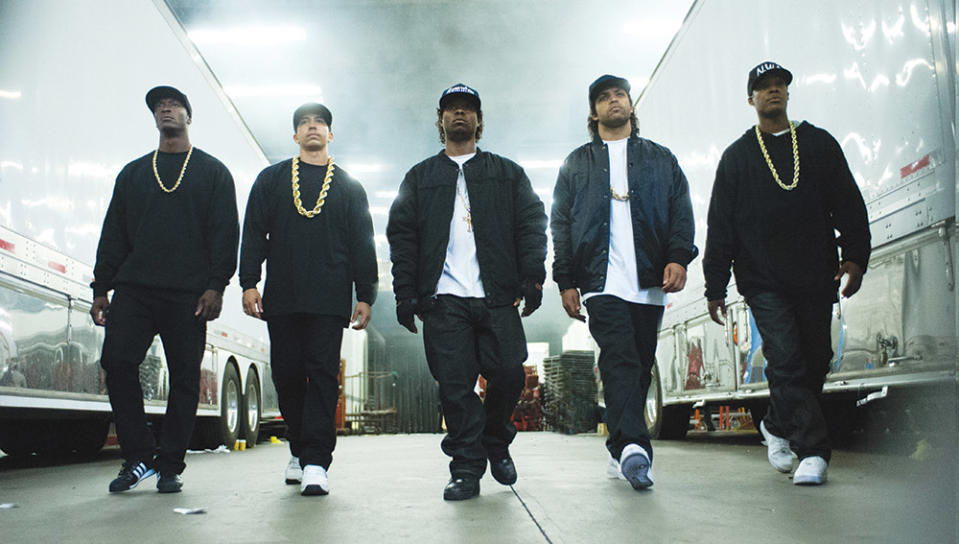
Did you want to be an engineer?
Never. But I’m very proud of graduating magna cum laude with a degree in electrical engineering. My dad was an engineer, so I knew that world and it seemed very boring. I always wanted to be an entrepreneur and run the world. But I had this opportunity that my parents would not allow me to pass up. Thank goodness they were smarter than me. Going to Florida A&M changed everything. I met my former business partner and lifelong friend, Rob Hardy, who wanted to be the next Spike Lee. “I said, ‘Listen, that sounds super far-fetched; we don’t know anybody in Hollywood. We don’t even know how to get to Hollywood, but I’m going to help you make a movie.’ ” I helped him raise $20,000, found the cast, did postproduction and struck a horrible deal with a company that distributed direct-to-video. We never saw a dime. But they did get our product on the shelves at Blockbuster. Back then, Blockbuster was a harbinger for success. It meant you were legit.
What was the name of the movie?
Chocolate City. It was about a college kid who comes to Florida A&M, one of the historically Black colleges and universities. It’s a whole new world because he’s only been around white people his whole life. We shot it in 1994, and it came out in 1995 or 1996. After we graduated, we moved to Atlanta and started Rainforest Films. The name was symbolic for us. There was a big push to save the rainforest at the time, and while that was important, we as young Black males were also an endangered species.
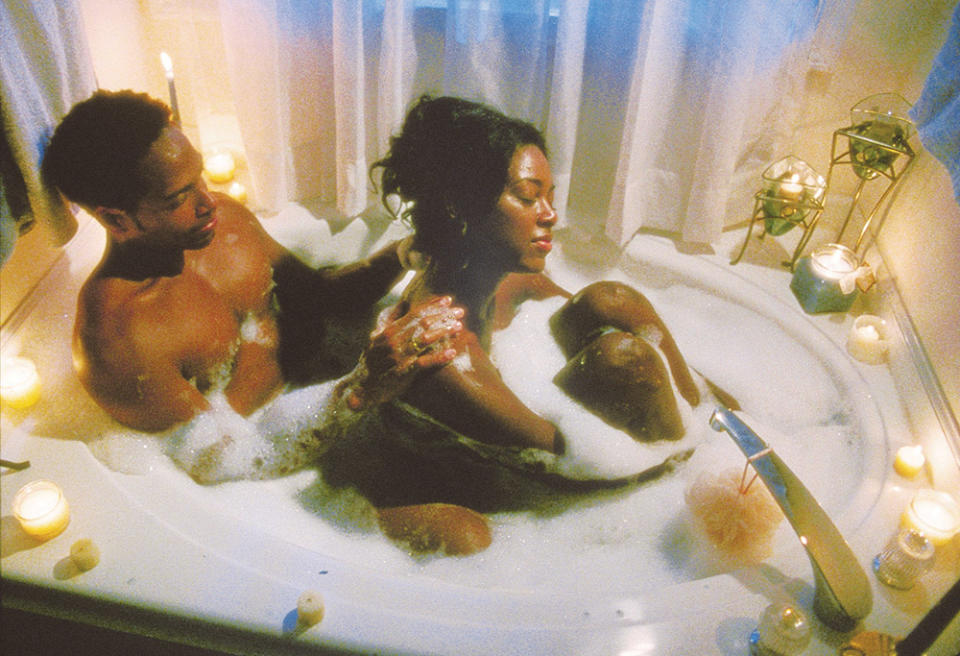
I’ve read that Rainforest’s first film was Trois.
Yes, it was an erotic thriller for an African American audience because there hadn’t been many. It was inspired by movies like Basic Instinct and Fatal Attraction. The reason I sit where I sit today is because I was very simply willing to do what other people were not. We took this little film that Hollywood didn’t give a shit about — not even the assistant’s assistant would call me back — and got it independently distributed into theaters. Remember when CinemaCon was called ShoWest? I had a buddy who worked at a magazine, and I flew to Las Vegas and snuck into the convention on a press pass. I met all these theater owners. At the time, they were in the red because they had these huge multiplexes and empty screens they couldn’t fill. I got a bunch of business cards, and I learned the business of exhibition.
That’s hysterical.
It’s crazy. This proves to you the audacity of Will Packer: As if it wasn’t enough for me to sneak in, I had the nerve to raise my hand and ask Will Smith, the male star of the year, a question at his press conference. Later, I contacted the theater owners I met and said, “Hey, give me your smallest house for one weekend and I will pack it out.” I got 19 theaters across the Southeast to do just that. We drove to every single market to promote the movie, and it worked. We secured the highest per-location average of any movie in the country on that weekend, and it caught the attention of an executive at Sony, Peter Schlessel. Benedict Carver, who worked for Peter, found the number for our little company and called. I put Benedict on hold and screamed at my partner, “Sony’s on the line!” That’s how we got a home video deal with Sony. We made two or three more Trois movies. I thought I was going to be an erotic thriller guy my whole career. I would go and pitch other stuff and they would be like, “No, no, no.”
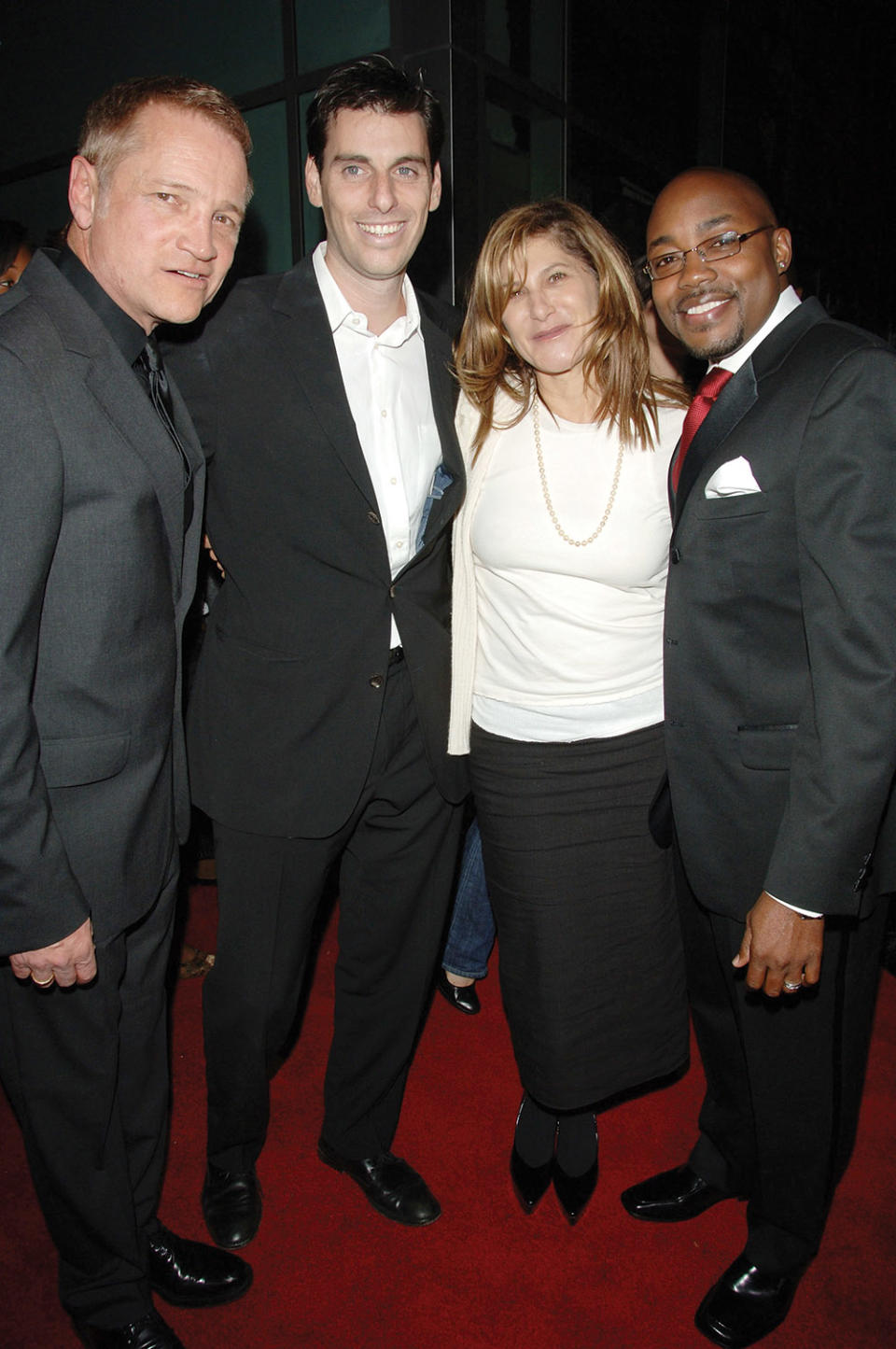
What was your theatrical break?
I was doing a straight-to-DVD movie called The Gospel, which was a faith-based film and a big departure from Trois. Clint Culpepper at Screen Gems saw it and loved it. He said, “This could actually do some noise in theaters.” We made it for $3 million. It ended up grossing about $15 million in 2005. We went to megachurches, church conventions, small churches, fish fries, family reunions, you name it.
What was the common refrain among studio executives about Black films at that time?
When I first came into the business, you had to make a Black film really small and really targeted. There was this perception that you can only make so many of them because African American audiences are not reliable in the way that mainstream audiences are. I remember when Stomp the Yard, a dance movie about Black fraternities, came out of nowhere and did all this business at the box office, I got calls from each and every last studio, asking, “Why didn’t you bring Stomp the Yard to me? We would have done it better than Screen Gems.” The truth is, I had pitched to all of the studios, and they all had said no. Of course, in the Hollywood way, I said, “Well, maybe next time.”
Do you care if your films cross over to white audiences and other ethnicities?
The core audience is always African American, but if you do it right, these films will definitely cross over. For a long time, a hero looked like a white straight male. Now, you have a lot of marginalized groups, and mainstream white people as well, who are more open than ever to seeing heroes that are not the traditional trope of what a protagonist should look like.
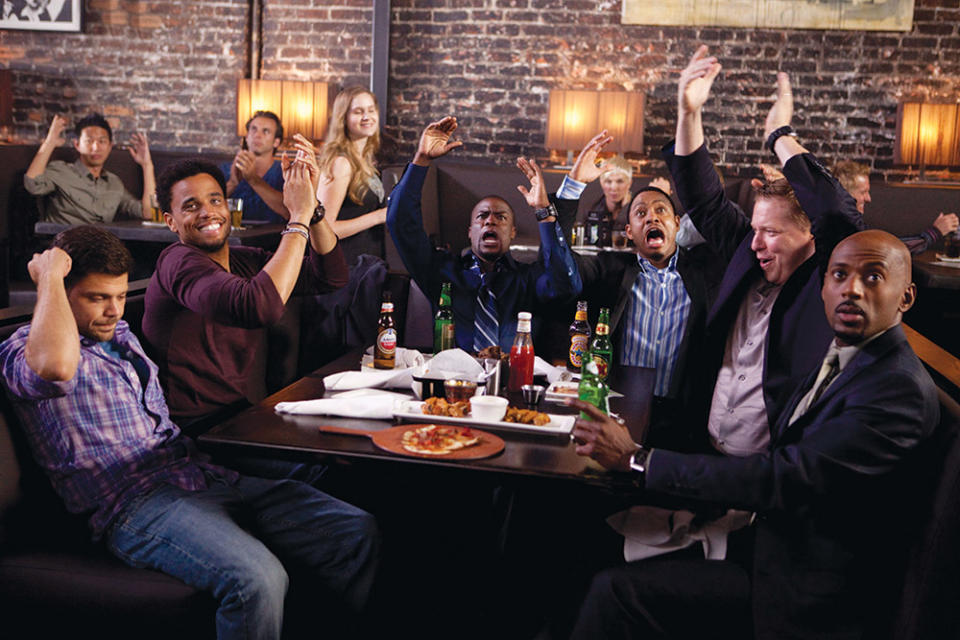
Donna Langley told me she was eager to be in business with you and asked you to dinner at Soho House in late 2012 or early 2013. She says that you needed more than one meal and more time. Why the trepidation?
I wasn’t trustful of Hollywood. I’d been successful on my own in Atlanta without any fancy Hollywood people telling me what to do. And I had a studio — Sony — to back my projects and distribute them, but I was still the engine, still the one going out and finding my audience. Now I was talking about a more formal Hollywood relationship. Universal’s not a person you can shake hands with and look in the eye to see if you think they’re telling you the truth. Donna Langley, that’s who I want to know. And I absolutely love Queen D.
Idris Elba, Regina Hall and Kevin Hart credit you for elevating their careers. And Tiffany Haddish thanks you for her breakout in Girls Trip. What is your trick?
The relationship with Universal and Donna started around Ride Along. Earlier, I had produced Think Like a Man, based on the Steve Harvey book, with this diminutive young actor named Kevin Hart who nobody in Hollywood thought was a star. But I realized he was a star in the Black community because all his comedy shows were getting bootlegged, passed around and sold everywhere, and his YouTube videos were going crazy. But Hollywood missed this buzz. When I came in to talk about Think Like a Man, an executive literally said, “Kevin Hart has been around for a while and had a movie called Soul Plane that didn’t work. He had a failed TV show. He’s always going to be the supporting guy.” I knew differently. I made him part of the ensemble in Think Like a Man, and he popped and was the centerpiece. When Donna got Ride Along, Ice Cube was attached, and it was supposed to be a salt-and-pepper buddy-cop movie about a white guy who is trying to date the sister of Ice Cube’s character. I said, “What if we put Kevin Hart in it? What if our white guy is actually a short black guy?” That ultimately worked, and Ride Along was the biggest Martin Luther King weekend opening in history and grossed $153 million globally.
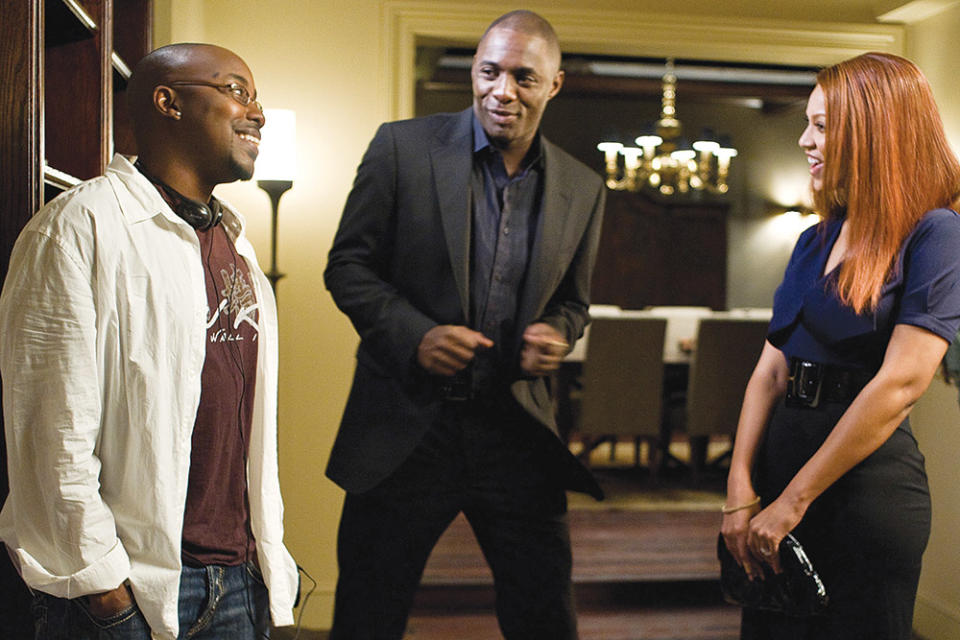
Will there be a Girls Trip sequel?
Absolutely. I’m closer than I’ve ever been and am actively working on it with [director] Malcolm D. Lee behind the scenes.
Malcolm says he was opposed to the scene where Jada Pinkett Smith’s character pees on the crowd when zip-lining. Is he exaggerating?
Don’t believe a thing he says. (Laughs.) Actually, it’s true. He said, “Will Packer, that’s a bridge too far.”
How did you persuade him to do it?
I said, “Listen, we’re in it now. If we’re going to go there, we’ve got to go all the way there.” We were already getting trepidation from others. They’d say, “You’re going to show Black women in a movie behaving so badly? This is something the audience is going to go for?” I said if you make it authentic, they’ll go for it. Malcolm said it was bathroom humor. Secretly, I knew it could go badly. Fortunately, when that scene played and went through the roof in our first test screening, I looked at him and just winked.
Hollywood made a lot of promises regarding inclusion in 2020 in the wake of George Floyd’s murder. Did Hollywood deliver?
I am intensely positive about the direction that we’re headed. But I’m also unflinching in saying that we’re not where we need to be. The world woke up after George Floyd and said, “Oh shit, we must do better.” It’s the year that I like to say white people woke up and realized they were white, and that it meant a lot of different things than what they were taught. There is such a dearth of authentic diverse content, so many stories that haven’t been told, so many filmmakers that should have an opportunity to tell their stories. We have a very, very long way to go.
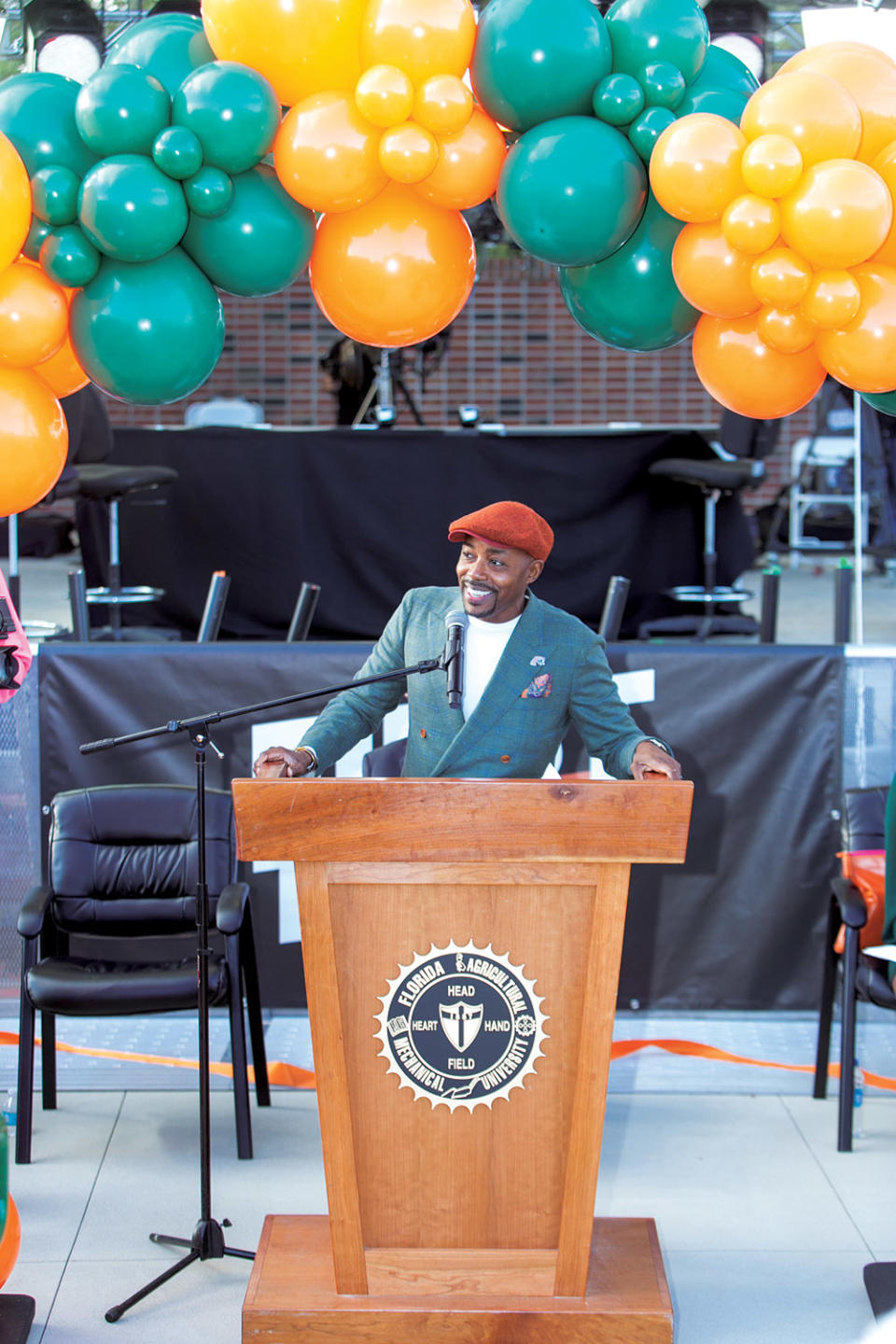
Your last theatrical movies were Little in April 2019 and Beast in August 2020. Why the gap?
It’s interesting you say that, because last year we shot four movies. But none were theatrical. We made movies for Peacock, MTV, Max and Disney+. I have a very loud, persuasive audience, and you know when my movies are coming out in theaters. There are full marketing campaigns, and it’s a cultural event to see a Will Packer movie in a theater. But, like everyone else in this industry, I’m subject to changing distribution metrics and methods.
So, the Oscars. Would you ever produce the ceremony again?
Never in a million years. No way, no how. I don’t mean to disparage the Oscars, Academy or anybody involved, but there’s literally nothing that would make me go back to it. Nothing. That box is checked. I’m glad I did it and don’t regret it for a second. It was the most diverse show in Oscar’s history in front of and behind the camera, and I’m proud of that.
How did you deal with the viral rumors after the slap, including that you never asked Chris Rock if he wanted Will Smith ejected from the building, as you stated on Good Morning America after the show?
First of all, it was live TV. Every decision I made was in the heat of the moment. You can certainly sit back and have the benefit of knowing everything that you know now and say, “Oh, I would make decisions differently.” I stand by every decision that I made. Afterward, there were all kinds of conversations. This thing captured the attention of the world. I’ll never forget when the White House press secretary was asked about the slap that week, and I was like, “Are you serious? Is there nothing else going on in the world? This is global news?” I didn’t try to dispel a bunch of rumors. I did that one interview on GMA and I was done with it.
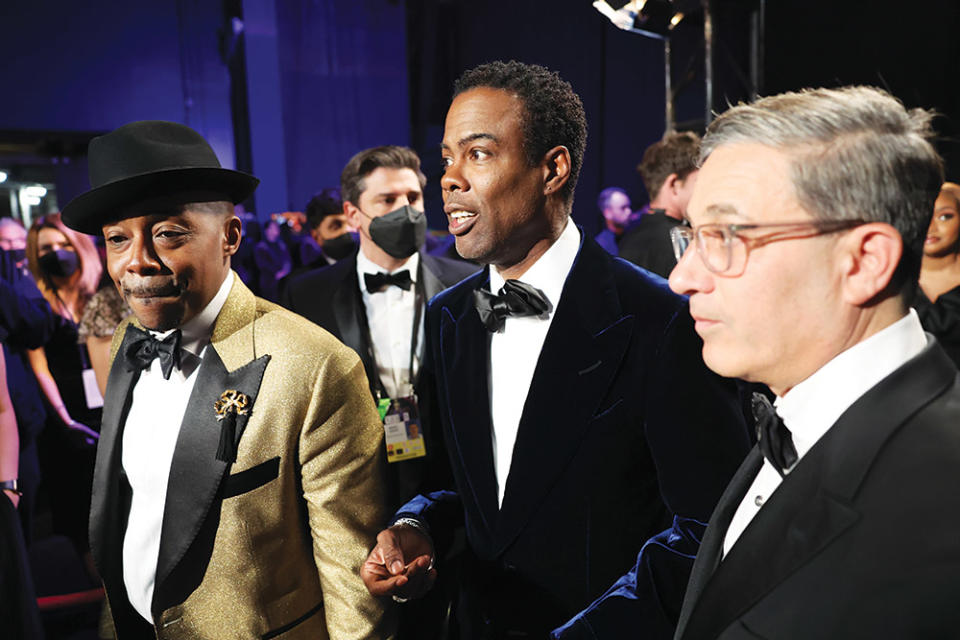
Did you speak with Will Smith and Chris Rock after?
I have. I’m good with both guys.
Who could’ve imagined how your lives would intersect years after seeing Will Smith at ShoWest. Did you ever return as a legit producer?
Oh my gosh, multiple times. It was surreal, a full-circle moment because I was invited. I was like, “Wow, look how far I’ve come.”
A version of this story first appeared in the Jan. 4 issue of The Hollywood Reporter magazine. Click here to subscribe.
Best of The Hollywood Reporter

